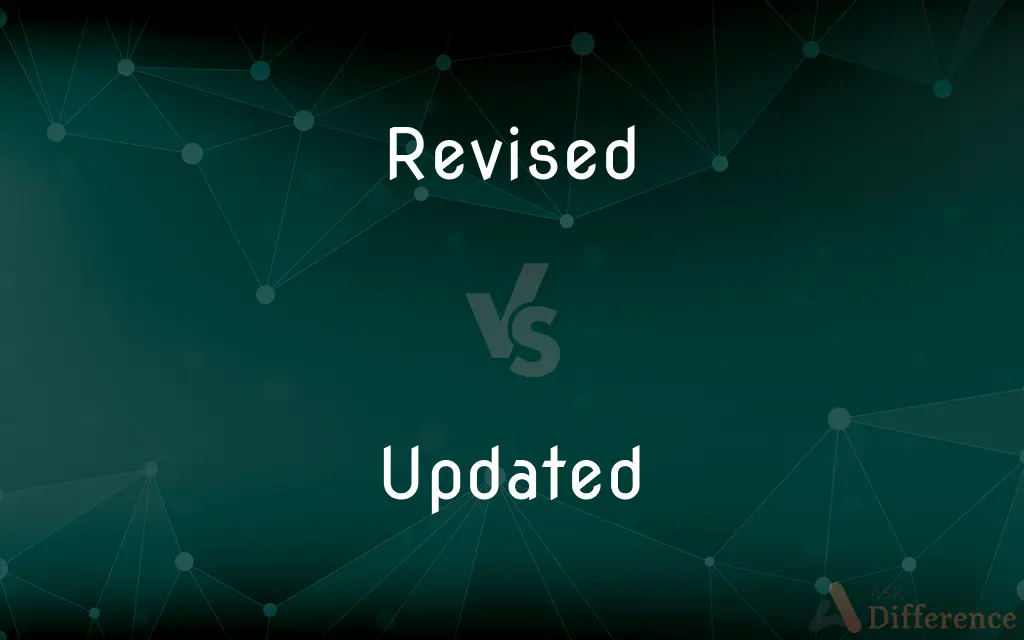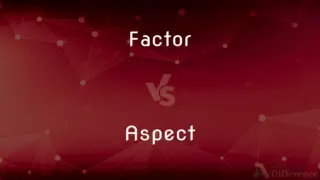Revised vs. Updated — What's the Difference?
By Tayyaba Rehman — Updated on August 18, 2023
Revised means making changes to existing content, while updated means adding the latest information or data.

Difference Between Revised and Updated
Table of Contents
ADVERTISEMENT
Key Differences
Revised typically means that something, such as a document or plan, has undergone changes or modifications. In contrast, updated means that something has been made current with the addition of new information.
When a book is revised, it suggests that some sections have been rewritten or adjusted. This could be due to errors, outdated information, or a change in perspective. On the other hand, when a book is updated, it might have new chapters or recent events added, ensuring it reflects the latest developments.
In software, when code is revised, it might be to fix bugs, improve efficiency, or change functionality. However, when software is updated, it often means new features have been added or compatibility with newer technologies has been ensured.
If we consider financial reports, when a report is revised, it's likely that some numbers or figures have been altered due to corrections or recalculations. Whereas, when it's updated, new financial data from a subsequent period might have been incorporated.
Lastly, in a more general sense, to revise can mean to revisit or re-examine something with the intent to make changes. To update is to refresh something by incorporating the most recent information or facts.
ADVERTISEMENT
Comparison Chart
Definition
Making changes to existing content
Adding the latest information or data
Typical Use
Correcting errors or reworking content
Incorporating new data or developments
Time Implication
Can suggest looking back or modifying past work
Suggests moving forward with new information
Intention
To correct, enhance, or modify
To refresh or ensure currentness
Result
Altered or modified version
A version with new or recent additions
Compare with Definitions
Revised
Changed in form or content.
The company's revised guidelines addressed the concerns of employees.
Updated
Modified to include the latest data.
The map was updated to show the new highway.
Revised
Altered or modified after reconsideration.
The revised manuscript was much clearer than the original.
Updated
Made current or refreshed with new details.
The updated app now includes a dark mode.
Revised
Corrected or improved.
She handed in a revised version of her thesis.
Updated
Brought up to date.
The company's website was updated to reflect its new branding.
Revised
Adjusted, usually to correct or enhance.
The revised budget allowed for additional marketing expenses.
Updated
Enhanced by the addition of current elements.
The curriculum was updated to include digital literacy.
Revised
Re-examined for the purpose of improvement.
The blueprints were revised to include a larger garage.
Updated
Renewed with recent information.
The weather forecast is updated hourly.
Revised
(of written or printed matter) having been altered or corrected
A revised edition of the novel
Updated
Made more modern or up to date
An updated bathroom and kitchen
Revised
To alter or edit (a text).
Updated
To alter so as to be up to date
Update a textbook.
Update the files.
Revised
To reconsider and change or modify
I have revised my opinion of him.
Updated
To inform (someone) with the latest information.
Revised
Chiefly British To study again (academic material, for example), as for a test; review.
Updated
Information that updates something or someone.
Revised
To make revisions, as in a text.
Updated
The act or an instance of bringing something or someone up to date.
Revised
Chiefly British To study something again; review.
Updated
An updated version of something.
Revised
(Informal) An act or product of revising; a revision.
Updated
Simple past tense and past participle of update
Revised
(Printing) A proof made from an earlier proof on which corrections have been made.
Revised
Simple past tense and past participle of revise
Revised
Improved or brought up to date;
A revised edition
Revised
Altered or revised by rephrasing or by adding or deleting material;
The amended bill passed easily
Common Curiosities
What does it mean when a document is updated?
When a document is updated, it's refreshed with new, recent, or additional information, ensuring it's current.
In what context is "revised" most commonly used?
"Revised" is commonly used in academics (revised edition of books), businesses (revised reports), and in contexts where content undergoes changes or modifications.
How is updating different from upgrading?
Updating is about adding the latest information or making something current. Upgrading, especially in technology, often means moving to a superior version or capability.
Is revising always about correcting errors?
No, revising can also be about enhancing, refining, or reworking content, not just fixing mistakes.
What does it mean when a document is revised?
When a document is revised, it undergoes changes, modifications, or corrections based on feedback, errors, or new insights.
Can a document be both revised and updated?
Absolutely. A document can be revised to correct errors or change content and simultaneously updated to include new information.
Why might a software be updated?
Software might be updated to add new features, ensure compatibility with newer technologies, or address recent requirements.
Do updates always mean something is better?
Not always. Updates ensure currency or freshness, but whether that's "better" is subjective and depends on the context.
Is revising the same as editing?
Not necessarily. While revising can involve editing, it's broader and can include reorganizing, rewording, or even removing content.
Why might a book be revised?
A book might be revised to correct errors, include new insights, update outdated information, or reflect a change in perspective.
Share Your Discovery

Previous Comparison
Brandish vs. Brand
Next Comparison
Factor vs. AspectAuthor Spotlight
Written by
Tayyaba RehmanTayyaba Rehman is a distinguished writer, currently serving as a primary contributor to askdifference.com. As a researcher in semantics and etymology, Tayyaba's passion for the complexity of languages and their distinctions has found a perfect home on the platform. Tayyaba delves into the intricacies of language, distinguishing between commonly confused words and phrases, thereby providing clarity for readers worldwide.
















































